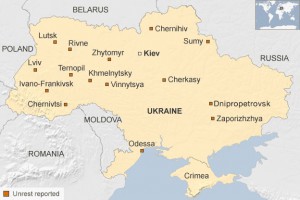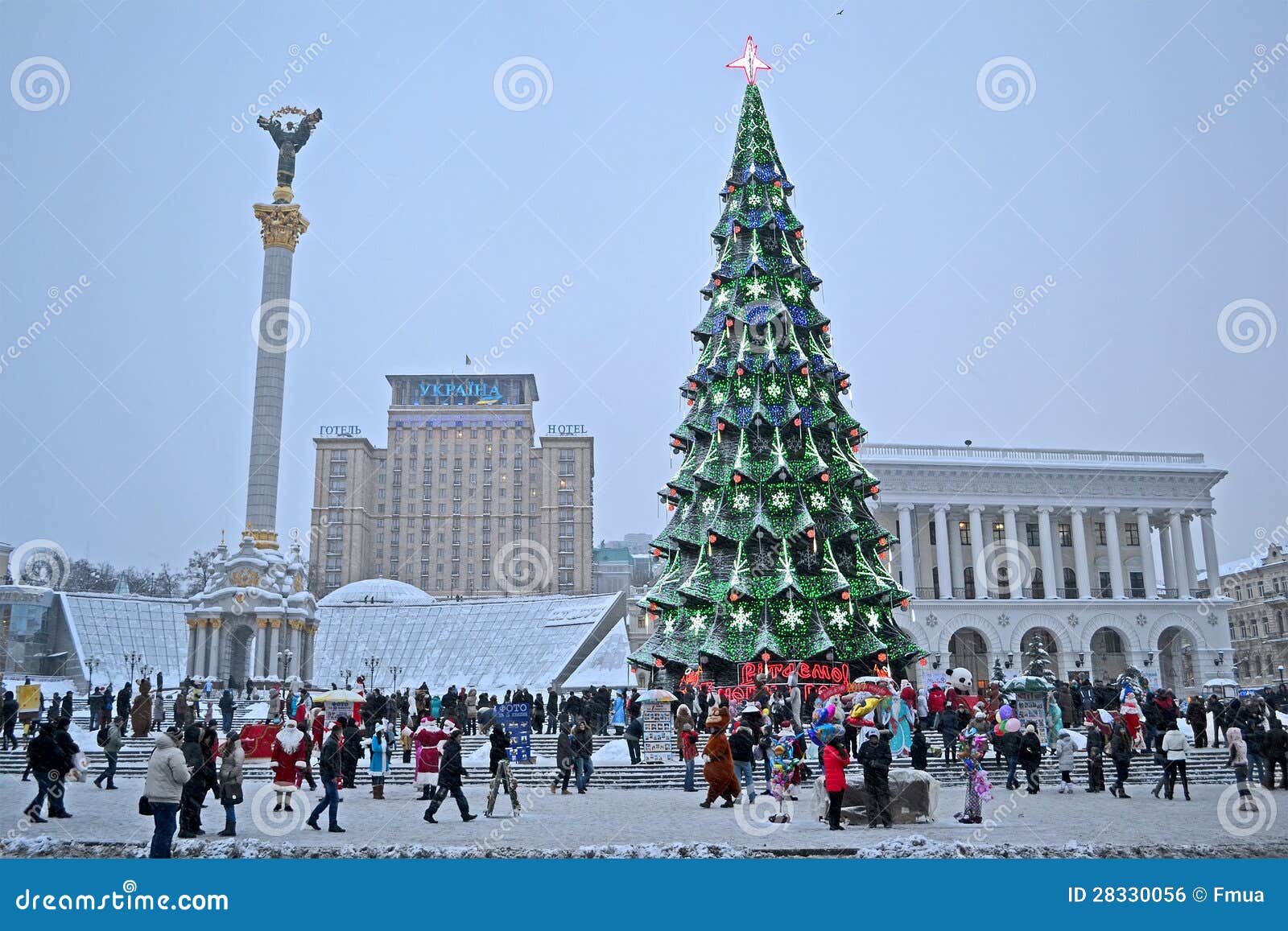Protests have gripped Ukraine since the government rejected a far-reaching accord with the EU in favour of stronger ties with Russia in November 2013.
They turned violent on 19 January, and deadly on 22 January in the capital, Kiev, where confrontation degenerated into rioting after the government brought in tough new legislation to end mass protests on the main square.
Opposition leaders and President Viktor Yanukovych then held talks, and on 28 January, Prime Minister Mykola Azarov and his cabinet resigned, and the Ukrainian parliament voted overwhelmingly to annul the anti-protest laws.
In another apparent concession, parliament then passed an amnesty law for detained protesters – but the opposition dismissed it and the demonstrations continue.
How bad is the violence?
Rioters hurl petrol bombs in Kiev, 22 January Independence Square has at times resembled a war zone
The scenes overnight on 19 and 20 January were some of the worst in nearly two months of demonstrations, with protesters torching police buses and hurling paving stones and petrol bombs at lines of riot police, while police responded with tear gas, rubber bullets and water cannon.
Two people were shot dead at the site of the Kiev protest camp on Independence Square on 22 January. Another was found dead with torture marks in a forest near the capital. On 25 January a fourth protester was said to have died from injuries sustained in earlier violence.
The interior ministry reported on 28 January that one of three policemen stabbed by protesters in the southern city of Kherson had died.
Hundreds of protesters and police officers have been injured in the unrest. Protests have spread to a number of Ukrainian cities, mostly in the west of the country but also in Mr Yanukovych’s traditional support base in the east.
Scores of protesters – by one estimate, more than 300 – have been arrested since the protests began.
What caused the protests?
Pro-EU rally on Kiev’s Independence Square, 15 December The pro-EU rallies in Kiev in December drew crowds of some 200,000
The anti-protest laws certainly raised passion among the protesters. They had prescribed jail terms for anyone blockading public buildings and banned the wearing of masks or helmets at demonstrations.
But the original trigger for the protests was President Yanukovych’s decision not to sign a major partnership deal with the EU, despite years of negotiations aimed at integrating Ukraine with the 28-nation bloc.
Thousands of pro-EU Ukrainians poured on to the streets of the capital, urging President Yanukovych to cancel his U-turn and go ahead with the EU deal after all. He refused, and the protests continued.
When riot police first took action on 30 November, the images of them breaking up a student protest and leaving dozens of people injured only fuelled anger with the president and boosted the crowds in Independence Square.
The authorities sought to defuse the anger through measures such as the suspension of the mayor of Kiev and the release of detainees.
On 17 December, Russia and Ukraine announced a major deal under which Russia would buy $15bn-worth (£9.2bn; 10.9bn euros) of Ukrainian government bonds and slash the price of Russian gas sold to Ukraine.
The deal appeared to take the wind out of the sails of the protest movement but when a pro-opposition journalist, Tetyana Chornovol, was beaten up by unknown assailants on 25 December, there was a renewed outcry.
Who are the protesters?
Boxer and politician Vitali Klitschko with raised fist at rally in Kiev, 1 Dec 13 Vitali Klitschko, with raised fist, hopes to become president in 2015. There are a number of main actors behind the rallies.
The protesters are mainly from the Kiev area and western Ukraine, where there is a greater affinity with the EU, rather than in the Russian-speaking east and south – though they include eastern Ukrainians too.
Vitali Klitschko, the former world heavyweight boxing champion and leader of the Udar (Punch) movement, has been a prominent demonstrator. He is very pro-EU and plans to run for president in 2015.
Arseniy Yatsenyuk, parliamentary leader of the country’s second biggest party, Fatherland, is an ally of Yulia Tymoshenko, the former prime minister now in prison.
The far-right group Svoboda (Freedom) is also involved. Led by Oleh Tyahnybok (pictured second from left), it stirred unease on New Year’s Day with a torch-lit procession through Kiev.
Other radical right-wingers include Bratstvo (Brotherhood) and Right Sector.
How has the West reacted?
The US embassy in Kiev revoked the visas of “several Ukrainians who were linked to the violence” after the deaths on 22 January.
EU leaders expressed shock at the deaths and called on all sides to halt the violence. Jose Manuel Barroso, president of the EU Commission, warned that the EU’s relationship with Ukraine might have to be reviewed.
The EU’s official position on the agreement abandoned in November is that the door remains open for Ukraine to sign but it has put any new negotiations on hold until there is a clear commitment to do so.
Both the EU and US condemned the now-revoked anti-protest laws, saying they were incompatible with Ukrainians’ democratic aspirations.
They also warned Ukraine not to introduce a state of emergency. Amid the concerns, top EU diplomat Catherine Ashton brought forward a trip to Ukraine to 28 January. She expressed alarm at the authorities’ handling of the situation and shock at the deadly violence.
Is Russia pulling the strings in Kiev?
Ukrainian President Viktor Yanukovych (left) shakes hands with Russian President Vladimir Putin at the Kremlin, 15 December The gas deal was announced after nearly four weeks of street protests in Ukraine
To many observers, the deal struck between Russia and Ukraine on 17 December points to a carrot-and-stick approach by the Kremlin.
The 2004 Orange Revolution led to Mr Yanukovych’s removal from power after his election was judged to have been fraudulent. Russia backed him then – and backs him now.
For centuries Ukraine was controlled by Moscow and many Russians see Ukraine as vital to Russian interests.

After the riots erupted on 19 January, Russian Foreign Minister Sergei Lavrov warned the protests were “getting out of control”, and accused European politicians of stirring up the trouble.
What happens next?
Mr Yanukovych, who was democratically elected in 2010, still has a strong support base in eastern and southern Ukraine, and there have been street demonstrations by his supporters.
On 25 January the president offered the opposition a number of senior positions in the government – including prime minister – but the deal was rejected.
On 28 January, President Yanukovych accepted the resignation of the prime minister and his cabinet, and parliament repealed the anti-protest laws.
On 29 January, parliament backed an amnesty law that would see arrested protesters released if their fellow protesters vacated occupied government buildings and unblocked streets and squares within 15 days. But the opposition refused to back it.
The stand-off appears set to continue, amid warnings that the country risks sliding into civil war.
END
Ed. note I have just noticed that things are so bad that one protester was taken out and beaten and left for dead in a forest. Fortunately he survived but instead of seeking medical treatment he presented his freshly beaten body to the media. It was absolutely chilling, and brings to mind the wrongness of the words of the song the revolution will not be televised?..Oh yes it will.




Recent Comments